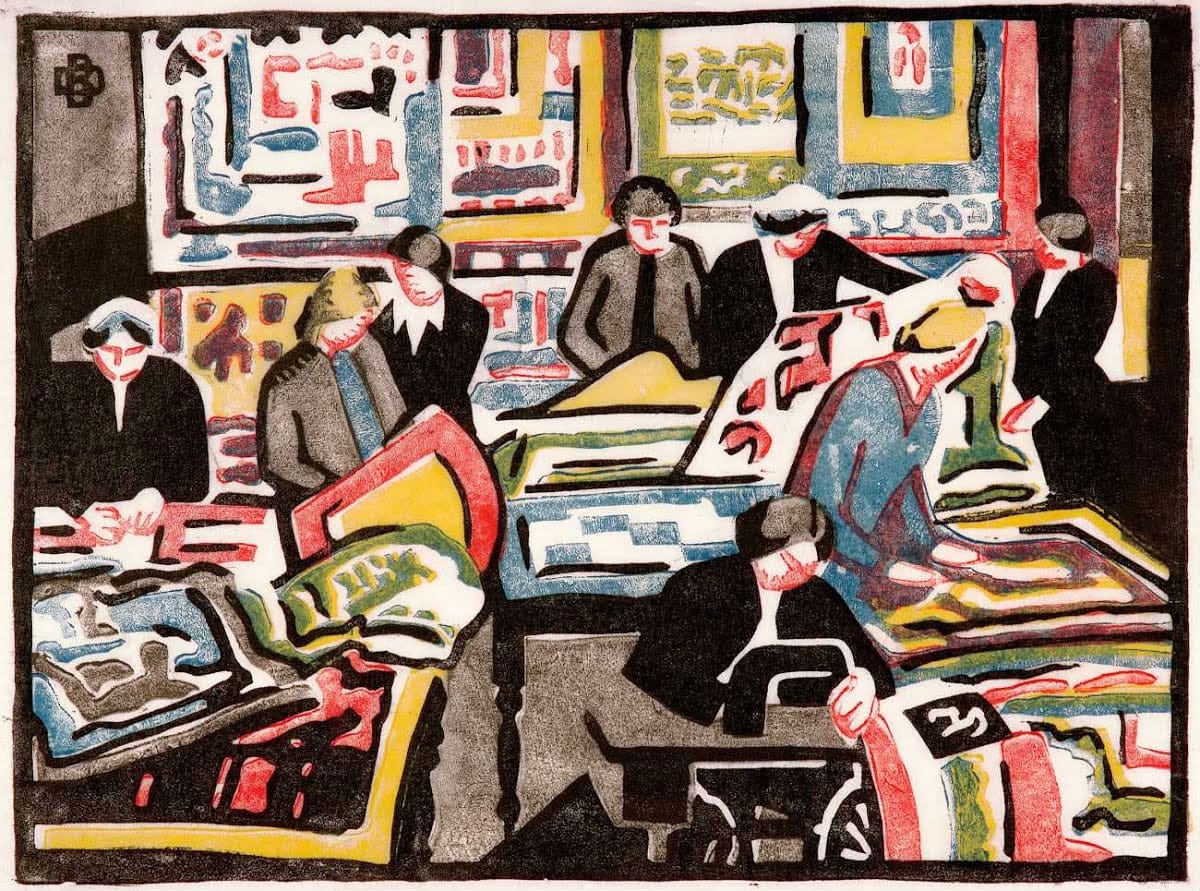I found Mrs. Zimmermann by entering two n’s in Google, not one. For thirty-eight years, I had wanted to thank my former middle-school teacher for an affirming memory. When I was in the eighth grade at St. Pius X, I had stepped over a desk instead of going around it. Mrs. Z (as we called her) saw me and yelled, “Mr. Kim! I know your parents, and I expect better from you!”
Perhaps surprisingly, instead of feeling chastened, I felt visible, seen for some potential I didn’t fully recognize at the time. Through the following decades, during my low moments, that one loud admonition served as the floor below which I could not sink.
Mrs. Z remembered me during our first phone call, but not the desk incident. She remembered something else. When I had left for college, my mother, who rarely left her little store, drove to school, sought out Mrs. Z, and handed her a silk scarf, saying, “Thank you, Louis is going to Brown.” I had either forgotten or never heard the story.
Months after I called her up, I met Mrs. Z in person. She was in her eighties, white-haired and now much shorter than I. She handed me an envelope, and inside was the scarf my mother had given her with a note: “Please give this to your sister.”
Such is the priceless and circular potency of gifts.
⎯⎯
In 1922, an anthropologist, Bronisław Malinowski, wrote about how men in an archipelago of eighteen islands in Papua New Guinea would travel hundreds of miles in canoes to exchange shell bracelets and necklaces. The original giver received something in return, but only after a circular transfer of gifts around the archipelago. This account spawned much research and reflection on what then seemed at once ancient and important—namely, “a gift economy.” The paradigm seemed to spark a wistful hope that modernity’s impersonal, market-based economics need not be our only future.
Lewis Hyde, in his seminal book, The Gift, lays out some aspirational notions of what constitutes a gift:
- Motion: A gift keeps on moving and loses value when hoarded and stalled
- Circle: Some artifact of a gift comes back to the receiver.
- Increase in value: A gift increases in value as it is transferred.
- Labour versus work: A gift is made with inspired labour and is not just an outcome of paid work.
- Bond: Gifts create bonds of social obligations.
- Community: Gifts enliven communities beyond just an individual giver and receiver.
Who cannot be drawn in by these ideals? Market economies seem cold and brutal by contrast. Even when conceding that most exchanges have elements of gift and market, the latter is accepted as a necessary blight, rarely an additive.
But I wonder if the duality must be so stark. Some of our most ardent idealists seem unnecessarily disengaged from the machinery of scale that undergirds and serves our modern world. Yes, such scale contributes to ills such as climate change and the exploitation of natural and human resources. But scale also brings us life-saving technologies in hospitals. It brings us electricity and water to our homes. In the room you occupy now, it’s likely that almost everything was made in a factory. The eyeglasses worn by over half of us are crafted through orchestration of raw materials mined, components molded, parts shipped over oceans, and credentialed professionals diagnosing our vision, all through mechanisms of market and industry.
The disconnect between idealists and the larger, market-based, industrial world leads to a lost opportunity to effect change on a global scale. I have seen this up close in my non-profit work as a founder and as a board member. Too often this separation relegates non-profits to below deck, inert on a ship steered by capitalists on an ocean of industry.
I see at least two challenges to the easy duality of gift versus the market. One is the difficulty of finding examples of these ideals operating with purity in our complex, interconnected, modern world. The second is an uncritical assumption that gifts are always higher in the moral hierarchy than commodities. I will consider these two challenges, and then explore what exactly in a gift economy could translate at scale.
Pure Gifts Buoyed by Hidden Mechanisms
Gift as a philosophy may seem necessarily unfettered, but the reality is that gifts are always enmeshed in a broader network of hidden systems. Hyde writes of the ethical complexities regarding usury: “Neither [gift nor commodity] is ever seen in its pure state, for each needs at least a touch of the other—commodity must somewhere be filled and gift somewhere must be encircled.” Hyde must know from the inside. He is the recipient of a MacArthur Fellowship grant of $500,000, an ideal gift in one sense: No applications are accepted, and the grant is given with no expectations of its use. Still, the only reason the MacArthur fellowship exists is because of a $7 billion endowment funded out of an estate from a family who owned a life-insurance company.
There are other examples of hidden mechanisms that challenge ideological purity. Food author Kristen Michaelis writes about why she gave up on veganism when she realized her fruits and vegetables couldn’t grow while “doing no harm”: “One tablespoon of soil contains millions of tiny organisms hailing from thousands of different species of animal,” she writes. “And that living soil feeds on death.”
Gifting Away Our Self-Approval
In the typical description of gift economies, there is an implicit hierarchy: At the bottom is giving something in exchange for remuneration—classic capitalism (or a caricature of it). Above this is what is regarded as a gift in a gift economy—giving something without remuneration, possibly without even acknowledgement by the receiver. This is regarded as a kind of moral pinnacle. But is it the peak? While the original giver may not receive even a gesture of appreciation from an eventual recipient, the giver is still receiving the coin of self-justification—that is, “I am a good person.” What if one were to give up something without even this final compensation?
In Martin Scorsese’s film adaptation of Shusaku Endo’s Silence, two seventeenth-century Portuguese Jesuit priests travel to Japan to investigate allegations that their mentor, an older Jesuit missionary, has renounced his faith. Near the end of the movie, one of the young Jesuit priests, Rodrigues, is pressured to step on a fumi-e, a physical likeness of Jesus placed on the ground, to stop the torture of Japanese Christians within his sight. He ends up stepping on the fumi-e, immediately anguished by the betrayal of his faith.
Some religious movie reviewers criticized the movie for seeming to approve of Rodrigues’s apostasy even though it alleviated the suffering of the other. Some reviewers went further, saying that Rodrigues robbed the Japanese Christians of a chance at martyrdom.
After this moment, the film advances a few years, and Rodrigues is shown to no longer be a priest and to have married. To many critics, this was the ultimate sign of Rodrigues’s cowardice and betrayal. For me, however, it was an illustration of the ultimate sacrifice Rodrigues makes, to alleviate the suffering of the other. He gives up his ultimate possession—that of the approbation of his God. Could this not be the ultimate gift?
On a less dramatic scale, let’s consider the artist who proclaims his virtue by giving away his art, claiming nothing for himself. But is nothing really returned to the artist? Is this artist willing to sign his art with a pseudonym, robbing himself of future praise? Christian Wiman wrestles with this question in My Bright Abyss:
I once believed in some notion of pure ambition, which I defined as an ambition for the work rather than for oneself. But now? If a poet’s ambition were truly for the work and nothing else, he would write under a pseudonym, which would not only preserve that pure space of making but free him from the distractions of trying to forge a name for himself in the world. . . . So long as your ambition is to stamp your existence upon existence, your nature on nature, then your ambition is corrupt and you are pursuing a ghost.
In exploring the virtues of being a giver of gifts, we are constantly in a moral battle to resist the call to distinguish ourselves from the common run of men. As Thomas Merton writes, “Who can escape the secret desire to breathe a different atmosphere from the rest of men? Who can do good things without seeking to taste in them some sweet distinction from the common run of sinners in this world?”
So how to consider the anonymous engineer in a cubicle designing the enabling part of a hospital diagnostic machine? No one knows her. She may not even like her job or feels any real validation. But hers is the contribution that will go out among the countless intermediaries of industry and ultimately into machines that will save lives. Is she not giving a gift as noble as the beadmaker in a tribe?
Preserving the Thread of Charity
Some seem resigned to believe that the ideals of gifts will never extend to industrial scale. Hyde says as much: “It remains an unsolved dilemma of the modern world, one to which anarchists have repeatedly addressed themselves, as to how we are to preserve true community in a mass society, one whose dominant value is exchange and whose morality has been codified into law.”
At heart, the ideal of a gift is selfless giving. And selfless giving is a recognition both of the dignity of the other and that this dignity ranks supreme. So is it possible for every context—no matter its norms, ends, or constraints—to conduct its business predicated on human dignity?
Michael Naughton is a theologian whose work centres on the intersection of spirituality and work. He writes of how, even in a corporation, the development of the individual must be held paramount: “People have priority over things, labor over capital, persons over technology, and . . . leaders of organizations must seek the development of people associated with the organization. Because of the origin and destiny of each person, her life is intrinsically valuable and sacred, and hence ought never be treated as merely a means to some organizational plan.”
Gift economies orient us toward a noble purpose. Businesses are often caricatured as only being about maximizing shareholder value. But the telos of a business is a fair exchange of goods and services. Yes, this telos is often forgotten for intermediate measures like profit and shareholder value. The theologian Kenneth Goodpaster coined the term “teleopathy” as the mistaking of intermediate measures as ultimate ends. Obsession with certain kinds of signalling metrics afflicts not only business but every human endeavour: Hospitals can get fixated on filling hospital beds, churches on filling the pews, lawyers on billable hours, professors on papers published. Even art can be affected when it becomes overly fixated on the agendas of patrons.
The exercise of meditating on the ideals of a gift economy crystallizes the key ingredients that we long for in all of our interactions—altruism, community, and ennoblement. It’s understandable that most of us feel these ideals are out of reach in the industrialized world. But if we retreat and surrender, we are losing an opportunity for creative moral engagement in the scale world that drives much of our modern security and prosperity. And at worst, our retreat becomes yet one more isolating cocoon of spiritual pride, the worm in us all.
Perhaps the key in bridging the ideals of gift economies and the market world is to transcend what is being exchanged, whether gift or commodity, and to look through the thicket of the market and remain steadfast in a service orientation toward other souls known and unknown. Apropos of my vocation in industry, I am reminded of John Ruskin’s essay “Unto This Last,” in which he discusses the ultimate role of a merchant:
Observe, the merchant’s function (or manufacturer’s, for in the broad sense in which it is here used the word must be understood to include both) is to provide for the nation. It is no more his function to get profit for himself out of that provision than it is a clergyman’s function to get his stipend. The stipend is a due and necessary adjunct, but not the object, of his life, if he be a true clergyman, any more than his fee (or honorarium) is the object of life to a true physician. Neither is his fee the object of life to a true merchant. All three, if true men, have a work to be done irrespective of fee—to be done even at any cost, or for quite the contrary of fee; the pastor’s function being to teach, the physician’s to heal, and the merchant’s, as I have said, to provide. That is to say, he has to understand to their very root the qualities of the thing he deals in, and the means of obtaining or producing it; and he has to apply all his sagacity and energy to the producing or obtaining it in perfect state, and distributing it at the cheapest possible price where it is most needed.
Maybe a way to take the ideals of gift economies and make them more real for most of us in a scale world is to look beyond what is given, whether art, craft, or commodity, and look instead at our inner orientation toward the other, regardless of distances spanned, and to consider that the nature of what leaves our hands can be gifted by what’s in our heart.



